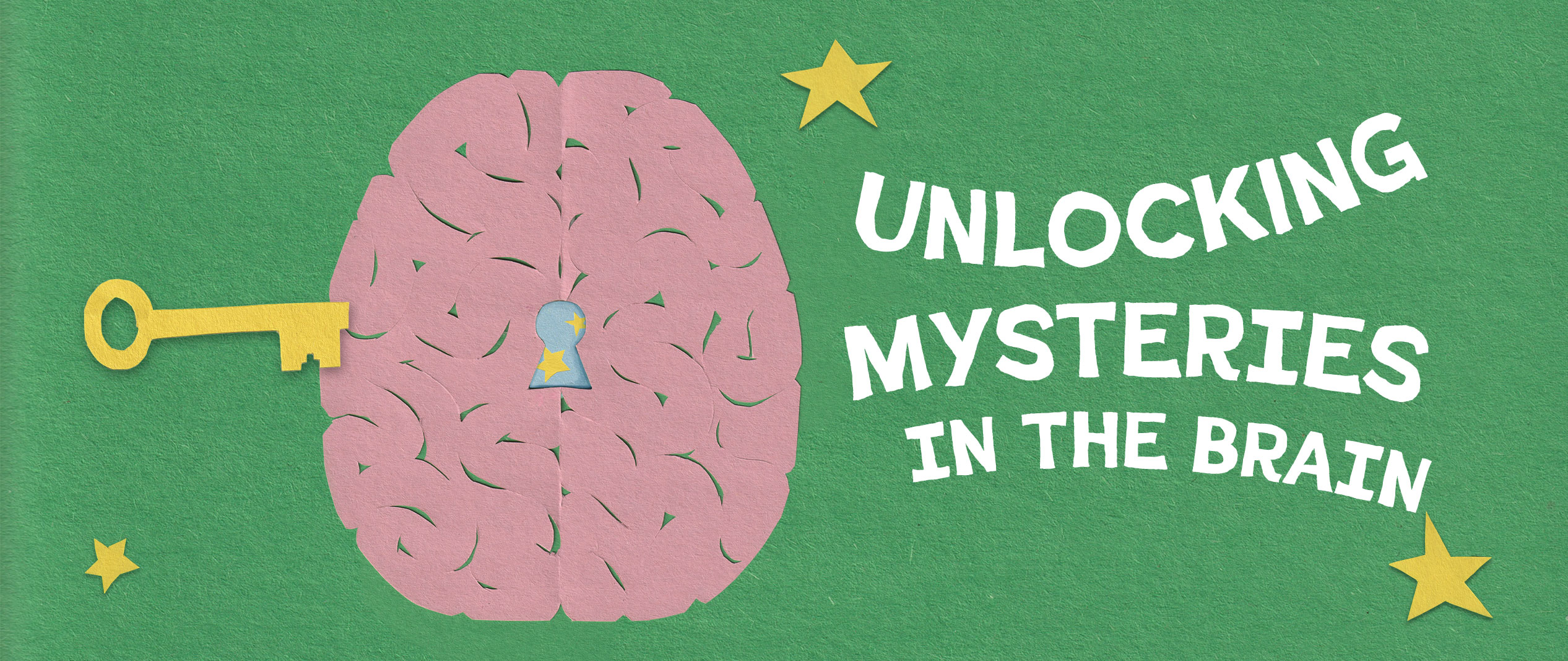Before there were MRI machines or CT scans—never mind the possibility of using AI to unlock the mysteries of the human brain—there was Civitan International.
Founded in 1917, this organization of volunteer service clubs throughout the globe spent the first four decades of its existence focused primarily on community needs such as food drives and services for the elderly. Then in the 1950s, Civitan began to focus on helping people with neurological developmental disabilities and became a major supporter of Special Olympics International.
By the late 1980s, Civitan decided to take its support to another level. Instead of just providing services to those affected by neurodevelopmental disabilities, Civitan wanted to fund research aimed at potentially discovering treatments and even cures for such disabilities.
So, in 1989, the Civitan Board of Directors pledged $20 million to create the Civitan International Research Center (CIRC). After reviewing applications from universities and medical organizations throughout the country, Civitan chose to place that center at UAB.
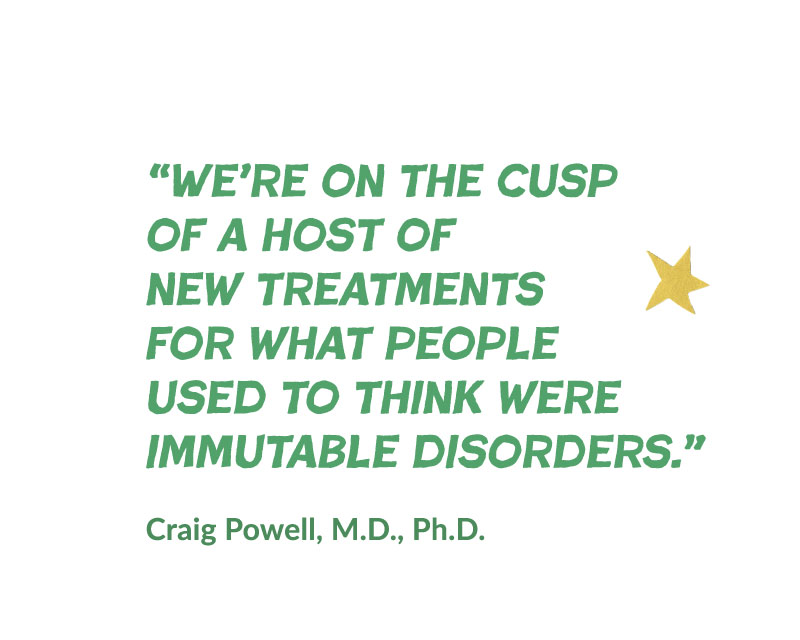 Today, CIRC, which celebrated its 35th anniversary in 2024, is a leader in researching the causes and potential treatments for neurodevelopmental disabilities and disorders. More than 150 Civitan scientists and staff are dedicated to basic and translational research in service of CIRC’s mission to improve the well-being and the quality of life of individuals and families affected by intellectual and developmental disabilities. In addition, the Civitan-Sparks Clinics at UAB provide support for families with children who have been impacted by developmental disabilities. To date, Civitan International has exceeded its initial $20 million commitment and has donated over $21 million to the CIRC, including a $1.25 million pledge in 2024.
Today, CIRC, which celebrated its 35th anniversary in 2024, is a leader in researching the causes and potential treatments for neurodevelopmental disabilities and disorders. More than 150 Civitan scientists and staff are dedicated to basic and translational research in service of CIRC’s mission to improve the well-being and the quality of life of individuals and families affected by intellectual and developmental disabilities. In addition, the Civitan-Sparks Clinics at UAB provide support for families with children who have been impacted by developmental disabilities. To date, Civitan International has exceeded its initial $20 million commitment and has donated over $21 million to the CIRC, including a $1.25 million pledge in 2024.
“We’re doing research that starts at the most basic science level in understanding brain function, and we’re conducting clinical trials that are on the cutting edge of the next treatments,” said Craig Powell, M.D., Ph.D., chair of the UAB Department of Neurobiology, who has been the CIRC director since 2018. “Then we’re going all the way to actually caring for patients and their families, so we’re involved in all levels of this process.”
For researchers and clinicians, the brain remains a perplexingly complex organism. But Powell says progress is being made in understanding some of the brain’s mysteries, which in turn is leading to promising treatments of a wide variety of neurodevelopmental disorders.
“There have been dramatic advances in the clinical treatment of genetic causes of all sorts of intellectual and developmental disabilities,” Powell said. “We have treatments that can slow the course of Alzheimer’s. We’re using brain stimulation to treat Parkinson’s. We can now virtually cure a genetic form of childhood ALS called spinal muscular atrophy with a one-time dose of gene therapy into the spinal fluid.
“We’re just beginning to see the emergence of multiple drug or medical therapies for specific genetic causes of intellectual developmental disability. We’re on the cusp of a host of new treatments for what people used to think were immutable disorders. Once you were diagnosed with them, you were stuck and there wasn’t much we could do for you other than behavioral treatments. But we’re beginning to discover medicines that can make a real difference in the lives of these children and their families. That’s a huge change from the past.”
Alignment and Innovation
One of Powell’s first moves as CIRC director was to create the Translational Research Core (TRC) within the CIRC and bring in clinical research psychologist Cassandra Newsom, Psy.D., as its director. The TRC includes spaces for evaluating children with intellectual disabilities, along with areas for post-docs and trainees to work.
“What this has done is transform our ability to do translational research that takes what we’re learning in the lab directly to the patients in the clinics,” Powell said.
For example, Newsom led the Phase 2 clinical trials of a novel drug for a genetic cause of autism and intellectual disabilities known as Pitt-Hopkins syndrome. That study was recently completed and the drug demonstrated significant benefits for patients.
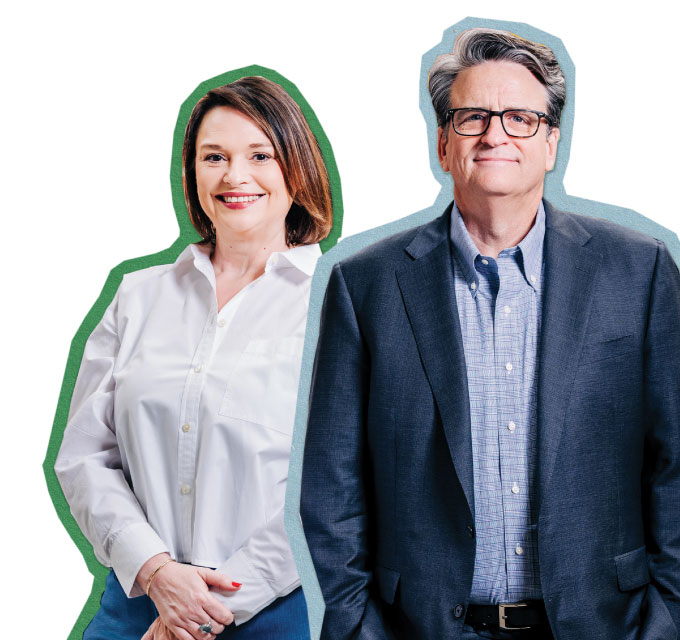 Cassandra Newsom, Psy.D. and Craig Powell, M.D., Ph.D.
Cassandra Newsom, Psy.D. and Craig Powell, M.D., Ph.D.
“This was the first drug trial for Pitt-Hopkins, and the first potential treatment for this condition,” Newsom said. “The results of that study will be used to work with the FDA to see if we can move forward with a Phase 3 trial. It’s exciting to be working on evaluating a drug for a disorder where there have not been treatments before.”
Newsom also is one of the lead investigators of the HEALthy Brain and Child Development Study, being conducted in collaboration with the University of Alabama, the National Institutes of Health, and a multi-site national consortium. It is the largest long-term study of early brain and child development in the United States and follows pregnant participants and their children for approximately 10 years. Data collected include structural and functional brain imaging; anthropometrics; medical history; family history; biospecimens; and assessments of social, emotional, and cognitive development. About half the sample includes those who experience adversities during pregnancy including, but not limited to, exposures to substances.
“We’re trying to understand how healthy brain development unfolds and what that looks like, and also what kinds of things can alter development trajectories and potentially cause problems,” Newsom said. “It can be environmental exposure, substance use, malnutrition, lack of access to prenatal care. We’re trying to take a broad look to see what kinds of risks and protective factors there may be that could promote healthier brain development in children.”
Newsom says the study is emblematic of the type of research that is possible at UAB through the CIRC and the support of Civitan International.
“The consistency of Civitan’s investment has given us a solid foundation to build on and support that vision of translational research for autism and neurodevelopmental disabilities. They have made it possible for us to pull some of the best researchers, scientists, and clinicians from across campus to increase the focus on neurodevelopmental research. That has really made a huge difference in the speed at which we can make innovations.”
The relationship between UAB and Civitan has been so successful that some elements have expanded out of the Civitan Building on campus. One of those is the Civitan International Neuroimaging Laboratory (CINL), which is housed at UAB Hospital-Highlands. As part of UAB’s Research MRI Core Facility, the CINL provides state-of-the-art MRI neuroimaging that examines a variety of neurological disorders, looking carefully at how potential treatments affect the brain.
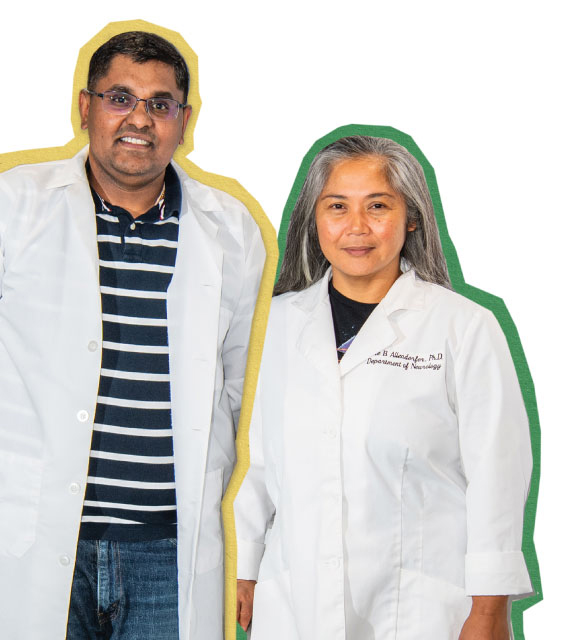 Virendra Mishra, Ph.D. and Jane Allendorfer, Ph.D.
Virendra Mishra, Ph.D. and Jane Allendorfer, Ph.D.
“We’ll do an MRI at baseline before treatment, and we want to see if there are any characteristics that may be able to predict if somebody will respond well to medication or an intervention,” said Jane Allendorfer, Ph.D., associate professor in the UAB Department of Neurology and co-director of the CINL along with Virendra Mishra, Ph.D., associate professor in the UAB Department of Radiology. “Then once you start treatment, what happens to the brain? Can we induce improvements by changing connections between brain regions or other characteristics that could help improve function for people with these different diseases and disorders?
“With Parkinson’s you think of a movement disorder. With epilepsy you think of a seizure disorder. But there are other things they endure like poor cognitive function, mood disorders, poor sleep. Can this intervention improve some of those, and are there corresponding brain changes with that? Similar questions arise with people with schizophrenia and ADHD. Does this intervention change the pathways of the brain?”
One of Mishra’s projects involves analyzing a potential connection between Parkinson’s disease and dementia. He notes that, while one of the most commonly recognized symptoms of Parkinson’s is tremors, approximately 80 percent of the patients develop dementia as well.
“This is something we’re trying to understand better. We’ll use the scan and look for any signals in the brain that can predict this,” Mishra said. “The goal is to manage the disease itself better, and not just the symptoms. If we can control the tremor, that’s great. But we also want to understand how we can stop the disease from progressing.”
Because of the complexity of the brain, Allendorfer says such research can take years to yield significant breakthroughs, which is why the sustained support from Civitan International is so important.
“Civitan providing these funds helps investigators try out things that could have a high reward,” Allendorfer said. “It gives investigators the freedom to think of new avenues to explore. That funding can go a long way and spearhead larger projects.”
A Vision of What Is Possible
While there is obvious significance to research that might lead to eventual treatments and cures for neurodevelopmental disorders, thousands of families in Alabama are dealing with the daily challenges that come with what can be a frightening and unfamiliar diagnosis. This is particularly true for parents who have young children with neurodevelopmental disabilities.
This is where the Civitan-Sparks Clinics for Developmental and Learning Disorders comes in. As part of the Division of Developmental-Behavioral Pediatrics in the UAB Department of Pediatrics, Civitan-Sparks provides evaluation, consultation, primary care, and even dental services for individuals with a wide range of neurodevelopmental conditions.
“We have a lot of different interdisciplinary clinics all in one building focused on children and youth with developmental disabilities,” said Sarah O’Kelley, Ph.D., training director at Civitan-Sparks. “We see children who have known or suspected developmental delays. We also have a broad training program for people going into the field of developmental disabilities.”
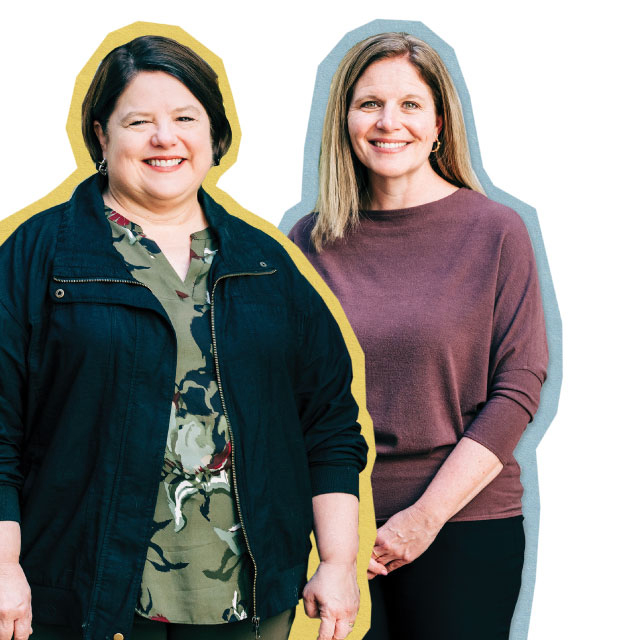 Laura McGuinn, M.D., and Sarah O’Kelley, Ph.D.O’Kelley, who has been with the clinic for 20 years, recently assumed leadership of Alabama’s University Center for Excellence in Developmental Disabilities Education, Research, and Service (UCEDD) and the UAB Leadership Education in Neurodevelopmental and Related Disabilities (LEND) training programs.
Laura McGuinn, M.D., and Sarah O’Kelley, Ph.D.O’Kelley, who has been with the clinic for 20 years, recently assumed leadership of Alabama’s University Center for Excellence in Developmental Disabilities Education, Research, and Service (UCEDD) and the UAB Leadership Education in Neurodevelopmental and Related Disabilities (LEND) training programs.
One of the initiatives O’Kelley has implemented at Civitan-Sparks is the Program for the Education and Enrichment of Relational Skills (PEERS®). The program was developed at UCLA by Elizabeth Laugeson, Psy.D., with whom O’Kelley collaborated before bringing PEERS to UAB.
“It’s a social skills program for teens or young adults who want to learn ways to make and keep friends,” O’Kelley said. “Often, our patients don’t know how to initiate contact or maintain a relationship. The program is caregiver-assisted, so a parent or caregiver is also part of the group and can work with their child in between sessions. We’ve seen great success with the program—it’s a popular clinical offering and training experience.”
In addition, Civitan-Sparks has started focusing more heavily on family assistance, especially for parents whose child recently received a diagnosis of autism or other developmental disability diagnosis. Civitan-Sparks Clinical Director Laura McGuinn, M.D., who also serves as director of the Division of Developmental-Behavioral Pediatrics, says this ability to branch out into more of a support role is possible because of funding from Civitan International.
“We’re here to help families navigate the available resources once they receive a diagnosis and the need is clarified,” McGuinn said. “Some people are struggling with basic needs like housing or food, and then you drop this very complicated diagnosis in their lives. So we try to hold their hands and connect them to community resources.”
This personal guidance and care are critical, according to Gwendolyn Brown, who has served as a family navigator for the UAB Regional Autism Network.
Brown says Civitan-Sparks provides the type of support she wishes she had received when her son was diagnosed with autism more than 20 years ago.
“As a parent, you receive this diagnosis and think, ‘How in the world can I do this?,’ because it’s a huge challenge,” Brown said. “But at Civitan-Sparks, they have social workers who immediately begin working with parents about the various resources available. It helps give parents peace of mind.”
Brown’s son is now 25 years old and works as a self-taught graphic designer. She says she often shares her experience raising an autistic child with patient family members at the clinic. “That’s the hope I try to give families, and everyone at Civitan-Sparks tries to give that hope, too,” Brown said. “The doctors and social workers really take the time to talk with these families and give them a vision of what is possible.”
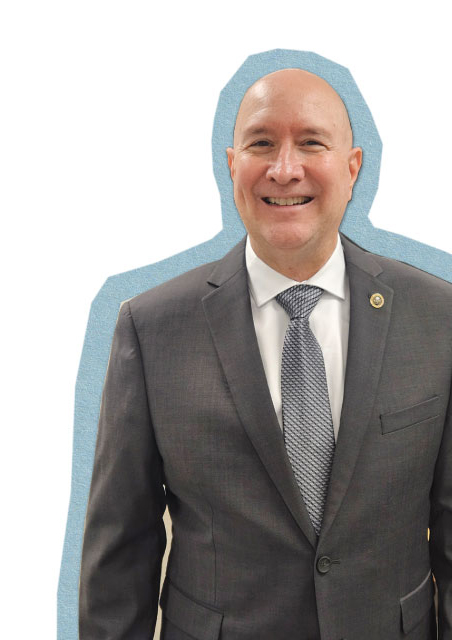 Mark Eisinger
Mark Eisinger
A Long-Haul Partnership
Mark Eisinger joined Civitan International as a volunteer the same year that UAB was chosen to be the site of the CIRC. He is now the organization’s executive vice president, meaning his work with Civitan has paralleled the group’s partnership with UAB. And from his view, it has been an extremely fruitful collaboration.
“Our members have really embraced the research center. They always look forward to hearing about the work that is being done there,” Eisinger said. “We had a Junior Civitan summit where Dr. Powell was the keynote speaker. They’ll take these students on tours of the center to see firsthand some of the things they are doing in the lab. The center always takes the time to share their progress with us.”
It is an impact that has been more than 35 years in the making, and one that Eisinger hopes will continue for many more years—if not decades—to come. He says while there still is much to be learned in the area of neurodevelopmental disorders, progress is being made thanks in part to the work taking place at the CIRC.
“The genes they have found and the ability to identify what’s happening within the brain are some of the biggest discoveries. These are going to be the puzzle pieces that are put together to improve treatment of these disabilities.”
That is the ultimate goal for Civitan International and for all those involved with the CIRC. And it is why the partnership between UAB and Civitan continues to thrive.
“The reason this works is because Civitan International has confidence in UAB’s ability to make a difference in the lives of these children,” Powell said. “They know that we’re caring for patients every day at multiple levels with multidisciplinary approaches. They know we have well over 100 researchers and scientists in their labs working on neurodevelopmental disorders. And we communicate with Civitan as scientists on a regular basis. We tell them the success stories of what the science is doing.
“We’re just beginning to scratch the surface on novel treatments. The more we understand about these intellectual developmental disabilities, the more likely we are to advance toward new medical treatments. Once we understand what goes wrong with the brain, we can try to figure out ways to fix it. We’ve come a long way in 35 years, and with the help of Civitan International, we’ll continue working toward those goals.”

